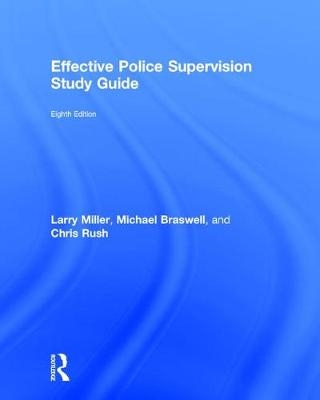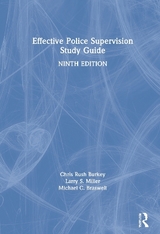
Effective Police Supervision Study Guide
Routledge (Verlag)
978-1-138-28879-9 (ISBN)
- Titel erscheint in neuer Auflage
- Artikel merken
This new edition, like the new edition of the textbook it accompanies, includes information on the following topics: police accountability, police involvement with news media, the challenges of dealing with social media, updates on legal considerations, and ways to avoid another controversy like Ferguson, Dallas, or Baltimore.
Larry S. Miller is a Professor in the Department of Criminal Justice and Criminology at East Tennessee State University. A former law enforcement officer and crime laboratory director, Miller has authored or co-authored seven textbooks, including Police Photography, Crime Scene Investigation, Report Writing for Criminal Justice Professionals, and Effective Police Supervision. His research interests and journal publications are in the areas of policing and forensic science. Michael C. Braswell is a Professor Emeritus at East Tennessee State University. He began his career as a prison psychologist and earned his Doctorate in Counseling Psychology from the University of Southern Mississippi in 1975. He joined the Department of Criminal Justice and Criminology at ETSU in 1977, where he taught classes on Ethics and Justice, Human Relations and Criminal Justice, and Film Studies in Crime and Justice. He is widely published, and his textbook Justice, Crime, and Ethics is particularly influential in the field of criminal justice. Chris Rush is an Assistant Professor in the Criminal Justice and Criminology Department at East Tennessee State University. She received her B.A. and M.A. in Criminal Justice and Criminology from East Tennessee State University and her Ph.D. in Criminal Justice from the University of Arkansas at Little Rock. She has published books and book chapters, as well as articles in peer-reviewed journals, including Deviant Behavior and Violence & Gender, and has worked with agencies handling program evaluation, prisoner re-entry, forensic training, and investigative policies and regulations.
A Note to the Student
CHAPTER 1-SUPERVISION: THE MANAGEMENT TASK
Learning Objectives
Key Terms
Chapter Summary
I Transition to First-Line Supervisor
II Supervisory Skills
III Management Expectations of the Supervisor
IV Subordinate Expectations of the Supervisor
V Peer Expectations
Multiple-Choice Questions
True or False Questions
CHAPTER 2-COMMUNITY-ORIENTED POLICING AND PROBLEM
SOLVING: IMPROVING NEIGHBORHOOD QUALITY OF LIFE
Learning Objectives
Key Terms
Chapter Summary
I Community Policing-What Is It?
II Empowerment
III Process Facilitation
IV Collaboration
V Problem Solving
VI Supervising the Community Policing Officers
VII Managing Failure
Multiple-Choice Questions
True or False Questions
CHAPTER 3-INTERPERSONAL COMMUNICATIONS STRIVING
FOR EFFECTIVENESS
Learning Objectives
Key Terms
Chapter Summary
I Importance of Communication Skills
II Communication Process
III Barriers to Communication
IV Overcoming Barriers to Communication
V Feedback
VI The Art of Listening
VII Nonverbal Communication
VIII Communicating with non-English-Speaking Individuals
IX Intercultural Communications
X Hearing-impaired Individuals
Multiple-Choice Questions
True or False Questions
CHAPTER 4-MOTIVATION: A PREREQUISITE FOR SUCCESS
Learning Objectives
Key Terms
Chapter Summary
I Why Officers Work?
II Needs-based Motivation
III Motivational-Hygiene Theory
IV Theory X-Theory Y
V Expectancy Theory
VI How to Motivate
Multiple-Choice Questions
True or False Questions
CHAPTER 5-LEADERSHIP: THE INTEGRATIVE VARIABLE
Learning Objectives
Key Terms
Chapter Summary
I Power
II Theories of Leadership
III Leadership Continuum
IV Leadership Mistakes
Multiple-Choice Questions
True or False Questions
CHAPTER 6-TEAM BUILDING: MAXIMIZING THE GROUP PROCESS 49
Learning Objectives
Key Terms
Chapter Summary
I The Individual
II The Individual and the Group
III Role and Function of the Group
IV Group Development Process
V Group Performance
VI Building a Winning Team
VII Team Goals
VIII Group Problem Solving
IX Conducting Meetings
Multiple-Choice Questions
True or False Questions
CHAPTER 7-CHANGE: COPING WITH ORGANIZATIONAL LIFE
Learning Objectives
Key Terms
Chapter Summary
I Factors Fostering Change
II Police Unions
III The Law
IV Positive Aspects of Change
V Resistance to Change
VI The Nature of Resistance
Multiple-Choice Questions
True or False Questions
CHAPTER 8-PERFORMANCE APPRAISAL: THE KEY TO POLICE
PERSONNEL DEVELOPMENT
Learning Objectives
Key Terms
Chapter Summary
I Performance Appraisal
II Frequency of Evaluation
III The Sergeant's Role
IV Methods of Appraisal
V The Human Factor
VI Validity and Reliability of Performance Appraisal
VII The Evaluation Interview
VIII Remediation
IX Follow Up
X Changes in Trends
Multiple-Choice Questions
True or False Questions
CHAPTER 9-COACHING, COUNSELING, AND MENTORING:
HELPING OFFICERS GROW AND DEVELOP
Learning Objectives
Key Terms
Chapter Summary
Multiple-Choice Questions
True or False Questions
CHAPTER 10-DISCIPLINE: AN ESSENTIAL ELEMENT OF POLICE
SUPERVISION
Learning Objectives
Key Terms
Chapter Summary
I Nature of Discipline
II Positive Discipline
III Negative Discipline
IV Disciplinary Systems
V The Hot Stove Concept
VI Disciplinary Action
VII Making Disciplinary Action Stick
Multiple-Choice Questions
True or False Questions
CHAPTER 11-INTERNAL DISCIPLINE: A SYSTEM OF
ACCOUNTABILITY
Learning Objectives
Key Terms
Chapter Summary
I Police Work
II Controlling the Police
III Personnel Complaint Investigation Policy
IV Personnel Complaints
V Social Media
VI Personnel Complaint Investigations
VII Adjudication
VIII Civilian Review Movement
IX Forecasting
Multiple-Choice Questions
True or False Questions
CHAPTER 12-SUPERVISING THE DIFFICULT EMPLOYEE:
SPECIAL CONSIDERATIONS
Learning Objectives
Key Terms
Chapter Summary
I Types of Employees
II Problem Employees
III Marginal Performers
IV Work Stressors
V Personal Problems
VI Early Warning System
VII Employee Assistance Program
VIII Critical Incident Stress Management
Multiple-Choice Questions
True or False Questions
CHAPTER 13-SUPERVISING MINORITIES: RESPECTING INDIVIDUAL
AND CULTURAL DIFFERENCES
Learning Objectives
Key Terms
Chapter Summary
I Coming to Grips with the Past
II Changing Demographics
III Supervising Minorities
IV Dealing with Employees in a Protected Class
V Handling Sexual Harassment in the Workplace
VI Supervising Gay and Lesbian Police Officers
VII Managing a More Educated Workplace
VIII Training for the New Supervisor
Multiple-Choice Questions
True or False Questions
CHAPTER 14-TACTICAL OPERATIONS: CRITICAL INCIDENT
DEPLOYMENT
Learning Objectives
Key Terms
Chapter Summary
Multiple-Choice Questions
True or False Questions
CHAPTER 15-LABOR RELATIONS: PROBLEM SOLVING THROUGH
CONSTRUCTIVE CONFLICT
Learning Objectives
Key Terms
Chapter Summary
I Management Rights
II Understanding Bargaining
III Union Goals
IV Grievances
V Impasse Resolution Through Job Actions
VI Contract Administration
VII Role of the Sergeant in Collective Bargaining
VIII Interest-based Bargaining
Multiple-Choice Questions
True or False Questions
CHAPTER 16-HOMELAND SECURITY AND TERRORISM:
A CHANGING ROLE
Learning Objectives
Key Terms
Chapter Summary
I Domestic Terrorism
II Foreign Terrorism
III American Response to Terrorism
IV Local Response to Terrorism
V Information Versus Intelligence
VI Identifying Potential Terrorist Targets
VII Police Supervisor's Role
Multiple-Choice Questions
True or False Questions
Answer Key to Objective Questions
| Erscheinungsdatum | 03.06.2017 |
|---|---|
| Zusatzinfo | Style copy: Community Policing, 7e. 978-0-323-34049-6 (adapt to 1-colour) |
| Verlagsort | London |
| Sprache | englisch |
| Gewicht | 499 g |
| Themenwelt | Recht / Steuern ► Strafrecht ► Kriminologie |
| Sozialwissenschaften ► Soziologie | |
| Wirtschaft ► Betriebswirtschaft / Management ► Unternehmensführung / Management | |
| ISBN-10 | 1-138-28879-9 / 1138288799 |
| ISBN-13 | 978-1-138-28879-9 / 9781138288799 |
| Zustand | Neuware |
| Haben Sie eine Frage zum Produkt? |
aus dem Bereich



